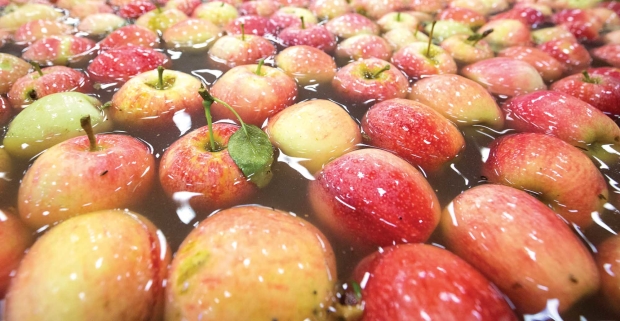
Apples from the 2015 harvest are washed and sanitized at a packing facility in Washington State. (TJ Mullinax/Good Fruit Grower
Good Point
By Christian Schlect

President, Northwest Horticultural Council.
More research is needed on the intersection of tree fruits and dangerous human pathogens; new and costly water-testing requirements for orchards are on the horizon; enhanced employee food safety training will be required; and a new federal regulatory enforcement regime, one attended by the threatening dark cloud of possible criminal sanctions, is moving into place.
Regulations implementing the Food Safety Modernization Act are now being finalized by the U.S. Food and Drug Administration.
Two such regulations were issued on September 10, two are scheduled for the end of October, and two more will emerge in 2016. They will have varying dates for full compliance.
The means to enforce these FSMA regulations is still uncertain. FDA claims insufficient resources in terms of both budget and personnel. It wants more money from Congress.
It would also like state departments of agriculture to be its “partners” in making sure the new law is followed in the produce field and packing house. States wonder who will pay for this new activity and worry about being viewed as an “enforcer against” not a “partner with” local agriculture.
Meanwhile, criminal penalties in food safety cases have been on the uptick as federal prosecutors seek jail time in egregious cases, such as the Peanut Corporation of America scandal where food safety tests were falsified and adulterated product was knowingly shipped to customers.
Making criminal or civil enforcement actions even more likely are recent advances in the testing technology for human pathogens.
The Centers for Disease Control and Prevention (CDC) is continuing to expand its use of whole genome sequencing, a much more accurate and quicker way of linking a specific food product with an adverse multi-state foodborne outbreak.
Food safety is popping up on other fronts, as well. Last winter, our apple industry was hit with a number of blows to its export efforts. Some were well publicized, such as the ocean shipping disruptions sparked by labor unrest at West Coast ports. A quieter export problem arose from the aftermath of a domestic food safety recall of caramel apples.
Prepackaged caramel apples were fingered as the culprit in a multistate outbreak of Listeriosis. This serious infection is caused by Listeria monocytogenes (Lm). CDC and FDA led the government’s response to this incident.
Eventually, the investigation found its way back to a specific supplier of Granny Smith and Gala apples: Bidart Brothers of Bakersfield, California. As one aspect of its work, FDA notified several foreign countries, mostly located in Asia, of the possibility that unsafe apples from Bidart Brothers might be in their local markets. These initial country-to-country warning notifications by FDA were coordinated neither with USDA’s Foreign Agricultural Service nor with private industry.
As a result of over-cautiousness and, perhaps, translation difficulties, some Asian countries temporarily restricted access for all apples from the United States (not just two varieties from one packing house with limited export sales), called for mandatory testing of U.S. apples for Lm at entry, or sent incendiary media warnings to their citizens about the dangers of U.S. apples. All this was eventually calmed down, but only after many weeks of effort and at the expense of lost sales.
The caramel apple incident was striking on two counts: One, it presented the first direct tie of fresh whole apples to a serious food safety outbreak, and two, it showed the real threat to essential overseas markets when our fruit is associated, even indirectly, with a domestic food safety event.
What is being done?
The Northwest Horticultural Council’s Food Safety Committee and staff will be reading and trying to interpret the FSMA regulations as they are published. Educational sessions for growers and packing house personnel on the new rules will be held over the coming months by the Washington State Tree Fruit Association.
Crisis communication plans—for both foreign and domestic markets—are being updated and coordinated between the United States Apple Association and the Washington Apple Commission. The Northwest Horticultural Council is assisting in this process.
The Center for Produce Safety, located in Davis, California, continues to be a valuable asset in coordinating much-needed research related to food safety and tree fruit, as well as other produce.
The Washington Tree Fruit Research Commission has also increased its efforts in funding and supervising research aimed at answering food safety questions hovering over our industry.
We are enhancing our industry’s interactions with CDC and FDA. As in past decades when we came to know the regulators at the U.S. Environmental Protection Agency when certain agricultural chemicals came under intense fire, we now need to know the officials and career employees at the main federal food safety agencies as new rules are developed and enforced.
Food safety is with us; it will not go away. Orchards and packing houses in the Pacific Northwest are adapting quietly and effectively to this hard reality.
As they successfully accomplish this, our growers and packers will keep their position as the world’s leaders in providing the best—and safest—apples, pears, and cherries to consumers around the globe. •






Leave A Comment